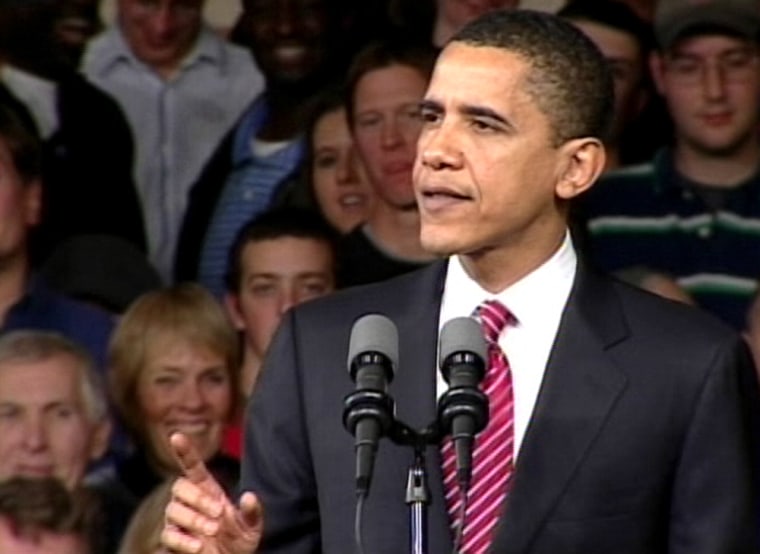There were two true stunners Saturday night: the size of Sen. Barack Obama’s margin of victory over Sen. Hillary Clinton — 28 percentage points — but just as significant this number: Total turnout for Democrats in their primary was greater than the turnout for the Republican primary in this state, which is one of the most loyally Republican in the nation.
Four years ago about 293,000 Democrats voted in the state’s primary: Saturday Obama alone got more than that number of votes.
Why did Obama win South Carolina and what does this triumph portend for future contests?
One short answer: He and his campaign staffers worked.
Thus Obama vindicated Sen. Hillary Clinton’s own New Hampshire campaign slogan when she said, “Some believe you can get change by hoping for it. I believe you get change by working hard.”
Democratic activists here in South Carolina said that the Obama campaign had perhaps the most extensive field operation ever seen in this state.
Superb field organization
The reach of the Obama field operation extended even to such often forgotten places as Allendale County, which has the second smallest population of any of the state’s 46 counties.
To cite another locale, Obama had had about 20 supporters working out of his Greenville, S.C. office since mid-summer; Clinton had only five or six starting in the fall, according to one Greenville Democratic activist.
The Obama high command showed a skill for picking talent: Craig Schirmer, a veteran South Carolina get-out-the-vote expert, was in charge of Obama’s mobilization effort in the state.
Obama also won because Clinton and her strategists, sensing defeat, apparently decided to trim their effort in the state.
“They basically pulled out of the state,” said veteran Charleston, S.C. Democrat Phil Noble, the president of South Carolina New Democrats, and an Obama supporter.
Clinton slackens effort
“They did no phones, they did no mail, any real extensive expenditures seemed to have stopped about two months ago,” Noble said.
“I’m a Yellow Dog Democrat and I didn’t get any direct mail” from the Clinton campaign.
“I got zero mail from the Clinton campaign in the last two weeks; I probably got six pieces from Obama and easily eight from Edwards,” said Greenville, S.C. Democratic activist Kevin Mertens, who supported Sen. Joe Biden, who pulled out of the race three weeks ago.
Clinton’s loss here puts even greater pressure on the New York senator to win in the massive round of Feb. 5 contests: California, New York, Colorado, New Jersey, Arizona, and other states.
The imperative is for her to come up with a new set of reasons for voters to not put their trust in Obama.
The line of arguments offered by Bill Clinton — that nominating a first-term senator would be “a roll of the dice” and calling Obama’s explanation of his stance on the Iraq war “a fairy tale” — fell far short here in South Carolina.
The lesson learned from Saturday’s Obama victory is that Obama’s appeal is broad — but not universal.
The fact that electorate was more than half African-American should not obscure this number: In Greenville County, which has higher average income and a more educated populace than the statewide average and which is 78 percent white, Obama won by a resounding 22 percentage points., annihilating Clinton.
As in New Hampshire and Iowa, exit polls indicated that Obama performed very well among those with post-graduate education and those with incomes over $200,000.
But unlike New Hampshire, Obama also outperformed Clinton among those earning less than $50,000 a year.
Clinton's bastions: women and older voters
According to exit poll interviews Clinton’s only strong demographic groups were white women, among whom she won 44 percent to Obama’s 22 percent, and voters aged 65 and older, among whom she got 40 percent to his 32 percent.
John Edwards had strong appeal where Obama and Clinton did not: among white male voters.
Obama got only an estimated 27 percent of such voters, while Edwards won 45 percent and Clinton got 28 percent.
The white males were only an estimated 18 percent of the Democratic electorate Saturday.
And in most of the upcoming Democratic contests, white males will likely account for only one quarter or less of the electorate.
But if he ends up winning the Democratic nomination, Obama’s lackluster showing among even Democratic white males is a challenge for his strategists to solve before November.
Obama’s strongest demographic group was black voters: he got nearly 4 out 5 of them. He also won two-thirds of those under age 30.
But House Majority Whip Jim Clyburn made clear that he’s had more than his fill of reporters asking about Obama winning 78 percent of black voters and 53 percent of the electorate being African American.
“Four years ago Al Sharpton, a black guy, ran here and a white guy won,” Clyburn noted. “So what’s wrong with black people voting for a black guy? They voted for a white guy four years ago.”
Asked how black voters across the nation would interpret Saturday night’s results, Clyburn, somewhat impatiently answered, “The same way white people are interpreting it. Here is is guy who gives me hope; he’s’ a guy of the future.”
That’s not an endorsement, but no matter — if Obama wins enough of the Feb. 5 contests, then every Democratic elected official will rush to endorse him and the nomination will be his.
